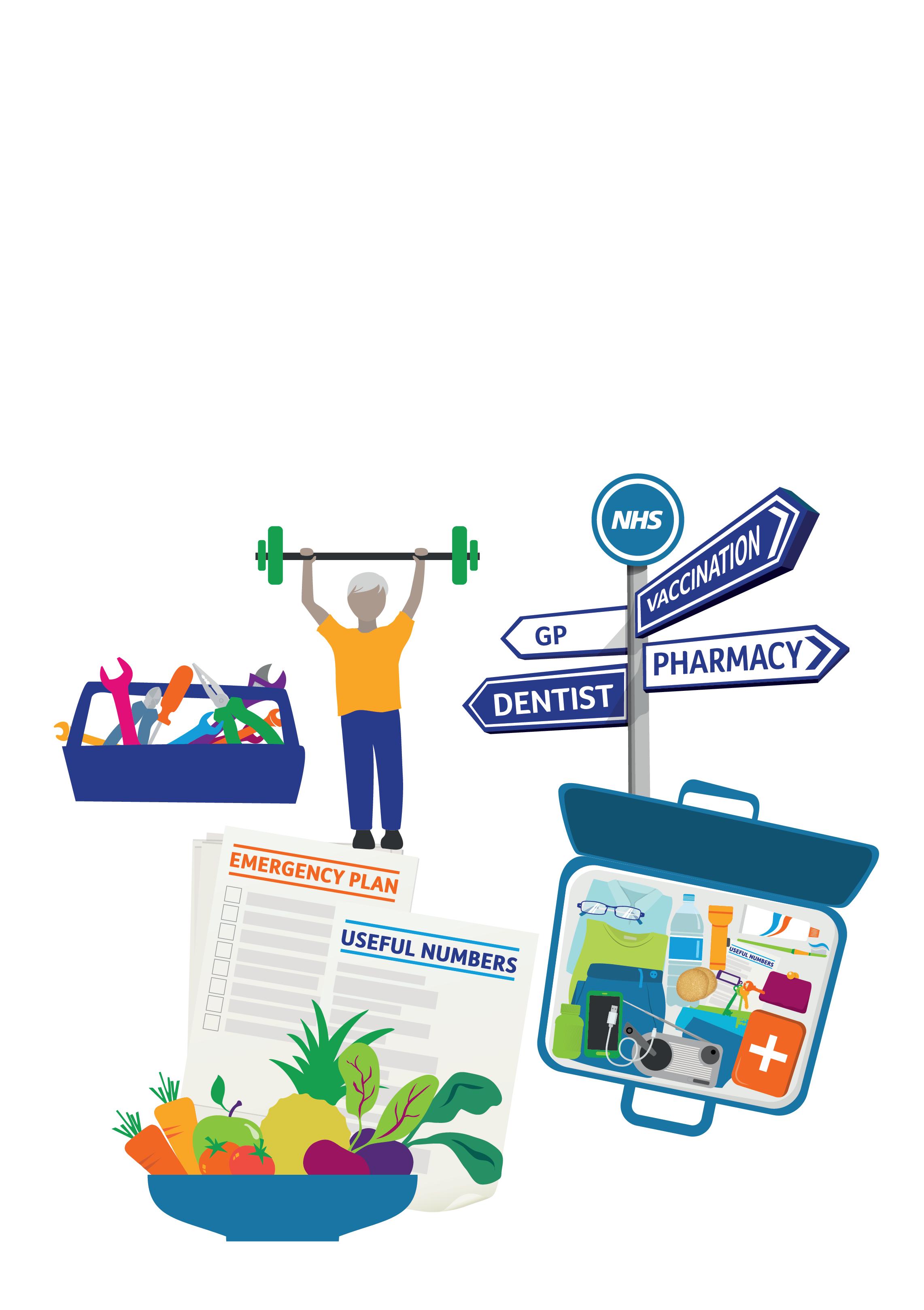

Being Prepared: Power cuts, extreme weather and beyond
Who we are
Age Scotland is the Scottish charity for older people. We work to improve the lives of everyone over the age of 50 and promote their rights and interests.
Our vision is a Scotland which is the best place in the world to grow older.
Our mission is to inspire, involve and empower older people in Scotland, and influence others, so that people enjoy better later lives.
We have three strategic aims:
We help older people to be as well as they can be
We promote a positive view of ageing and later life
We tackle loneliness and isolation
How we can help
We know that growing older doesn’t come with a manual. Later life can bring changes and opportunities to your life and you may need to know about rights, organisations and services which are unfamiliar to you.
That’s why we provide free information and advice to help you on a range of topics including benefits and entitlements, social care, legal issues such as Power of Attorney, housing and much more. All of our guides are available to download for free from our website, or you can contact our helpline team to have copies posted to you for free.
Our helpline is a free, confidential phone service for older people, their carers and families in Scotland looking for information and advice.
Later life can bring times when you just need someone to talk to. Our friendship line is part of our wider helpline and older people can call us for a chat. We’re here to listen, provide friendship and offer support.
This information guide has been prepared by Age Scotland and contains general advice only. It should not be relied upon as a basis for any decision or action, nor used as a substitute for professional advice. Neither Age Scotland nor any of its subsidiary companies or charities accepts any liability arising from its use and it is the reader’s sole responsibility to ensure any information is up to date and accurate.
Please note that the inclusion of named agencies, websites, companies, products, services or publications in this information guide does not constitute a recommendation or endorsement by Age Scotland or any of its subsidiary companies or charities.
Introduction
Preparing for major emergencies is important to protect our safety and well-being. Finding ways to make everyday life more manageable can also help us to remain resilient for when challenges arise.
This guide looks at things you can do to put yourself in the best position to deal with life’s ups and downs. It includes ways to help prevent problems and where to get help if you need it.
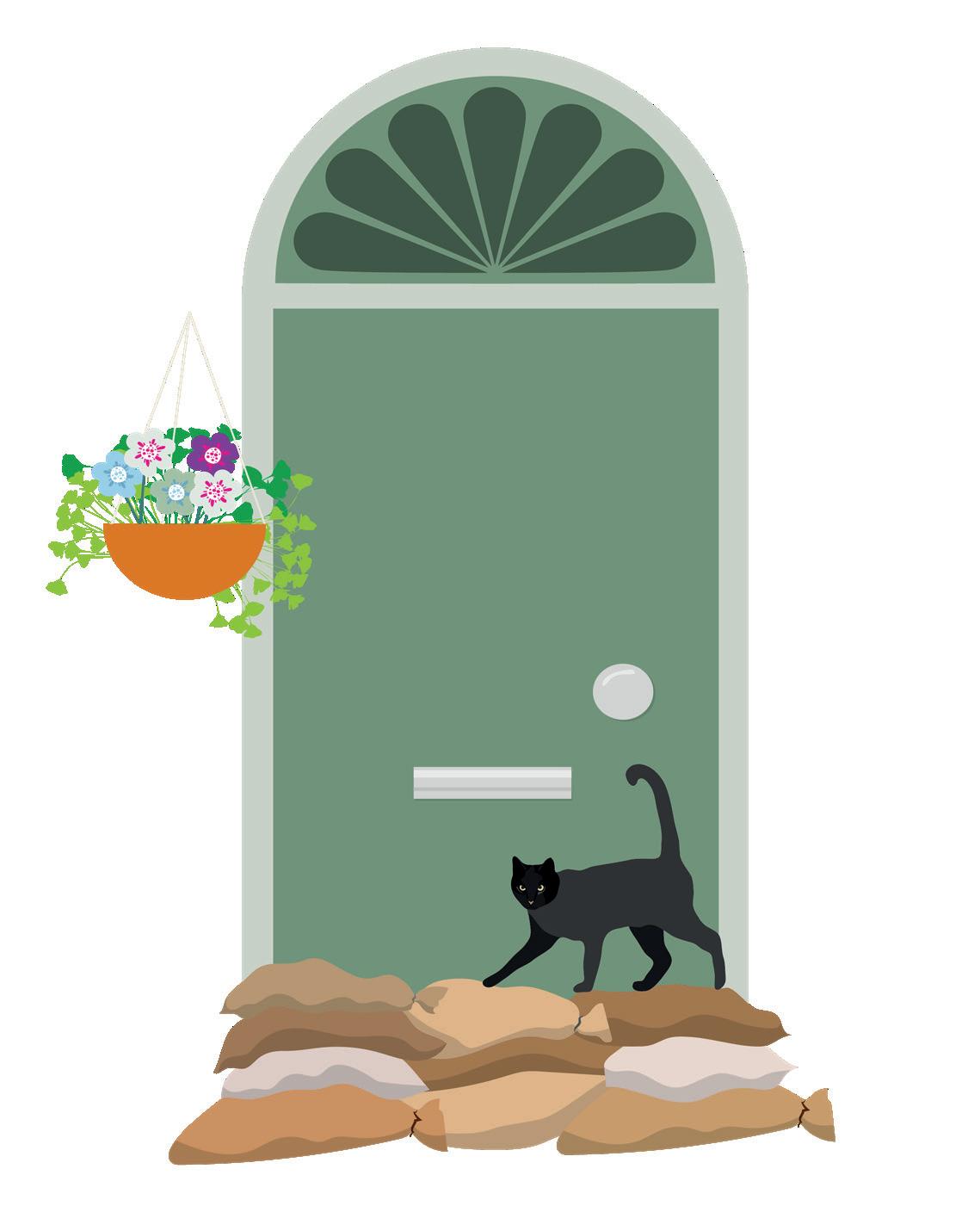
Preparing for emergencies
Writing an emergency plan
It can be difficult to think straight in an emergency, such as a flood or power cut. For this reason, it can be a good idea to write out an emergency plan and keep it somewhere accessible. Your plan should include:

• Where to turn off your electricity, gas and water supply
• Important contact numbers
• Who to tell that you are safe
To get you started, here are some contact details to include in your plan:
• In a power cut or other electrical emergency: call 105 to be connected to your energy supplier and report a problem
• Gas leaks and emergencies: call the Gas 24-hour Emergency Services on 0800 111 999
• Water and wastewater emergencies: call Scottish Water on 0800 0778 778
• Flooding: for information about flood risk in your area, call Floodline on 0345 988 1188. Live updates are also available at floodline.sepa.org.uk/floodupdates
• In an emergency where there is a threat to public safety: call emergency services on 999
Emergency survival kits
Put together an emergency survival kit for each member of your household, in case you need to leave your home quickly. These should be kept somewhere you can easily find them in the dark, in case of a power cut. They should be small enough to carry and include the essentials you would need to spend a few nights away from home.
Things to include:
• A copy of your emergency plan
• Small supplies of regular medications
• Toiletries and sanitary supplies
• A small First Aid kit
• Bottled water and a supply of high-energy foods that will keep for a while in your kit (such as snack bars)
• A change of clothes
• Spare keys
• Spare pair of glasses or contact lenses
• Battery powered or wind-up radio
• Torch and spare batteries
• Cash – in a power cut, you may not be able to pay by card for things like food and transport
• A spare mobile phone charger and power bank
Arranging insurance
The person who lives in a property is responsible for arranging insurance for their belongings. The building itself is usually insured by the property owner. However, check this with your landlord if you are a private tenant.
Affordable insurance can be hard to find, especially if your home has been damaged before. If your home is at risk from flooding, the Scottish Flood Forum can provide advice on getting the right insurance for your belongings and property. They can help you find affordable insurance from insurers that take part in the Flood Re scheme. Flood Re is a joint Government and insurance industry initiative that allows insurance companies to keep their prices affordable and still be able to fund payouts for flooding.
Visit www.floodre.co.uk for more information or contact your insurer to see if they take part.
Flood Re insurance policies can also include Build Back Better. This is a payout up to the value of £10,000 to cover the installation of Property Flood Resilience measures when a property is being repaired after a flood. This can reduce future insurance premiums as properties are better protected against future flooding.
Visit www.floodre.co.uk/buildbackbetter.
Alerts and priority services
• Your gas or electricity supplier may have a Priority Services Register (PSR) for people over pension age, or who have a disability or long-term health condition. Services include advance notice of service disruptions, help to arrange an alternative energy supply if you need this for medical equipment, and priority getting your energy supply restored after a power cut.
• The Scottish Environment Protection Agency’s Floodline provides an update service to alert you when your area is at risk of flooding. If you have an email address, you can complete the sign-up process online at floodline.sepa.org.uk/floodupdates. Call 0345 988 1188 to sign up without email.
• The Met Office provides weather warnings on its app, on social media and via email. Visit www.metoffice.gov.uk/weather/ guides/warnings for more information.
• Tune into local radio stations to hear the latest updates on weather conditions.
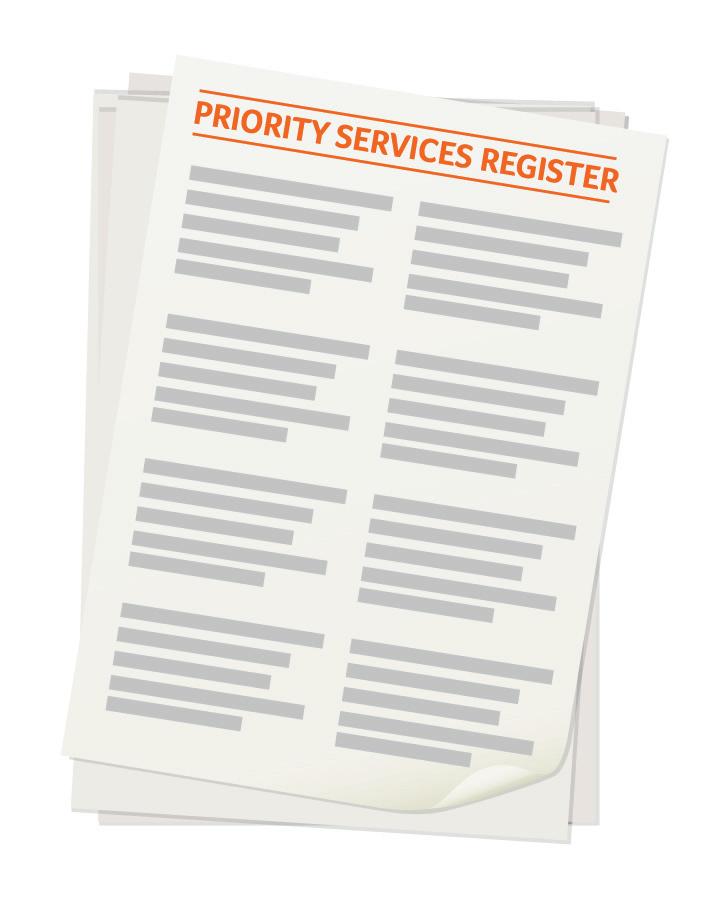
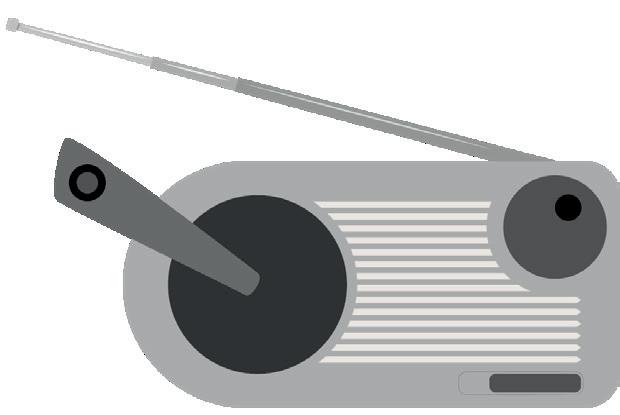
Upcoming changes to landlines
Landlines across the UK are being replaced by a new digital system. Although traditional analogue landlines are not affected by power outages, the new digital system will need a power supply to function. This means alternative options will be needed during a power cut. This section provides more information about the switchover, including solutions for staying connected when the power goes out.
Switching to digital
Work started in Scotland in July 2024 and the switchover is due to be completed by the end of January 2027. In most cases, this will involve disconnecting your analogue landline and creating a digital phone line via an internet connection.
If you do not have the internet and do not want to get this, it will be possible to switch to the digital system on a landline-only phone package. If you are on a low income, ask your provider about their social tariff. This is a lower cost tariff for people who receive certain means-tested benefits, such as Pension Credit.
You will be contacted at least four weeks before the switchover is due to take place in your area. You will be given information about how to use the new technology with your existing equipment; in most cases you will be able to keep your existing phone. You will also be able to keep your phone number.
You will NOT need to pay to make the switchover to digital. Beware of any cold callers who ask for payment to switch you to a digital landline. If this happens to you, report it to Consumer Advice Scotland by calling 0808 164 6000 or visit www.consumeradvice.scot.
Staying connected during power cuts
Mobile phones will usually still work during a power cut. If you do not have a mobile phone, it is a good idea to invest in one. Basic models are available for as little as £20 and there is no need for a monthly contract. Instead, you can ‘pay as you go’ by topping up your phone with credit that can be used to send messages and make calls.
You should check which networks have signal in your area before buying a mobile phone. Visit checker.ofcom.org.uk/mobile-coverage or call the Age Scotland helpline on 0800 12 44 222 if you do not have access to the internet.
You should charge your mobile phone regularly, and make sure it is charged up if bad weather is forecast. It is also a good idea to invest in a power bank that can be used to recharge your phone while the power is off.
A ‘hybrid’ emergency back-up phone will be available from telecommunications companies for anyone classed as vulnerable. This includes people who:
• live alone
• use a telecare system, also known as a community alarm
• live with a disability or health condition
• do not own a mobile phone, or do not have mobile signal in their area.
Hybrid phones have a battery back-up in case of a power cut. Alternatively, you may be provided with a separate battery back-up for an existing handset. Battery back-up can last for up to 8 hours but will run down faster if you make phone calls; you should only make essential calls during a power cut. A hybrid handset or separate battery back-up may also be available to people living in areas affected by frequent power cuts.
One free digital voice adapter will be available to vulnerable customers. These adapters allow you to connect a second phone in your home using a nearby plug socket. This does not require wires or additional connection points. Further adapters can be ordered if needed but you may need to pay for these.
If you use telecare services
You should contact your telephone provider to make sure they know you have a telecare system. They will delay your switchover to give extra time to test your telecare system, to make sure it will work if the power goes out.
You should also contact your telecare provider to check that the devices you use will be compatible with a digital phone line. They may need to provide you with alternative equipment that will work with the new technology.
If there are problems connecting your telecare system to digital, you can keep your traditional landline until this can be resolved. The analogue landline system will only be available until 2030, so providers will be working to find solutions as soon as possible.
Organising your paperwork
Knowing where to find important information and documents can save time and stress in emergency situations. It can also help you keep track of everyday appointments, bill payments and your finances.
Important contact details
Keeping useful contacts handy means problems can be resolved much faster. Make sure you include contact details for your:
• doctor
• dentist
• energy suppliers
• phone provider
• insurance companies
• trusted tradespeople or landlord to take care of repairs
You may already have gathered details like these in a safe place, such as an address book. If not, the Age Scotland Lifebook provides space to write down key information that may be helpful to you or others.
You may also like to order a copy of our Useful Contacts guide. Call the Age Scotland helpline on 0800 12 44 222 or visit www.age.scot/publications.



Keeping a filing system
It is a good idea to store important documents in a waterproof folder or filing box with sections for different types of services. You might want to have labels for:
• health and medical
• money
• housing
• bills and utilities
• driving and vehicles
• travel
• pets
If your paperwork is mounting up, try setting aside ten minutes a day for the next week to sort it into categories.
Many documents are now sent by email or via online accounts. Make sure you check emails regularly if you have services managed this way. You can print copies of emails and online statements if you find this helpful for keeping track.
Help with finances
Money worries can cause stress and make you feel less able to deal with other challenges. This section is about getting the most from your income, and making sure you are claiming any benefit entitlements you have.
Cost of living help
Support with the cost of living is available from the government, local authorities and some suppliers and services. For example:
• benefits available from Social Security Scotland or the Department for Work and Pensions
• help with energy costs if you meet certain criteria - see page 12
• help with health costs such as glasses, contact lenses and dentist charges if you have a low income; ask for an HC1 form at your GP surgery, pharmacy or hospital
• Council Tax reductions, discounts or exemptions
• free bus travel for those aged 60 or over, or those with a disability
• local warm spaces and food banks
Other ideas for making savings include:
• joining the loyalty scheme for your local supermarket
• switching providers for your insurance, phone or internet when it is time to renew; beware of packages that are cheap at first but go up in price
• social tariffs - these are discounted phone or internet packages for people claiming benefits such as Pension Credit. Some providers also offer discounts for older people who are not receiving benefits.
For more information and advice, see our guides
Money Matters, Help to manage your money and benefits and Help with Council Tax. Call the Age Scotland helpline on 0800 12 44 222 or visit www.age.scot/information.
Getting a benefit check

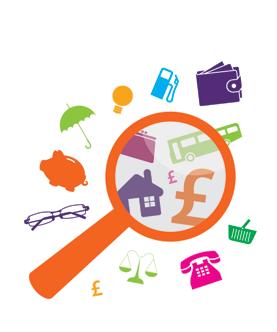
Many older people in Scotland are not claiming all the benefits they are entitled to. If money feels tight, or if your circumstances have recently changed, it may be a good idea to get a benefit check.
You can check your benefit entitlements online at www.age.scot/benefitscalculator.
If you would prefer to speak to someone, call the Age Scotland helpline on 0800 12 44 222 and ask for a benefit check. Helpline staff will book a time for a benefits adviser to call you back.
Age Scotland also has a Benefits Maze guide that explains the different benefits available. For a copy, call the Age Scotland helpline on 0800 12 44 222 or visit www.age.scot/information.
Help with energy costs
The last few years have seen energy prices soar, which can make winter a stressful time. Depending on your eligibility, you may be able to get help with the cost of heating your home:
Winter Heating Payment - a single payment made by Social Security Scotland each winter, to people who receive certain benefits and meet specific criteria during the qualifying week in November.
Pension Age Winter Heating Payment (replaces Winter Fuel Payment) - a single payment made each winter to people in Scotland who have reached State Pension age by the end of the qualifying week in September, and whose annual income is no more than £35,000 before tax. This will be paid by Social Security Scotland from winter 2025-26.
Warm Home Discount - this is a once-yearly scheme run by certain energy suppliers, providing a limited number of energy bill discounts up to £150. To qualify, you must pay your energy bill directly to your supplier. You must also either receive the Guarantee element of Pension Credit, or have a low income and meet other criteria set by your supplier.
For more information on managing energy costs at home, see our Warm and Well guide. Call the Age Scotland helpline on 0800 12 44 222 or visit www.age.scot/information.
Reducing risk at home
Preventing problems before they arise can save hassle, time and money. This section provides advice on reducing the risk of some problems and mishaps that can happen at home.
Having repairs seen to
Making repairs quickly can reduce the risk of accidents or further damage.
Tenants:
Fittings and appliances provided as part of a tenancy agreement are the responsibility of your landlord. You should contact them instead of arranging or attempting repairs yourself.
You should also contact your landlord for leaks, blocked toilets, and any structural damage. They will arrange for someone to look at the problem and carry out repairs.
If you live in sheltered accommodation, your Sheltered Housing Officer can help you to arrange repairs. For other tenants, your tenant handbook should give you details of how to report repairs if you are unsure.
Homeowners
Make sure you use traders you know you can trust. You can search for traders in your area vetted by your local Trading Standards team at www.trustedtrader.scot. Your local Care and Repair may also be able to provide help with some home repairs. They provide services to people who are aged 60 plus or disabled. Visit www.careandrepairscotland.co.uk or call the Age Scotland helpline on 0800 12 44 222 for help finding your local branch.
If your property is at risk of flooding, it is especially important to take advice when carrying out renovations or improvements. Even installing flood protection measures can cause further damage if flood water is more than 0.6 metres deep. The Scottish Flood Forum can provide advice on how to protect your property. Call them on 0131 563 9392.
Practical help at home
Most of us find it difficult to accept help, but there are many reasons having help at home can be a good idea. For example, it could prevent you from injuring yourself during physical tasks. It can also free up valuable time for looking after your well-being.
Getting a care needs assessment
If you struggle with daily tasks and could use some help, you can ask for a care needs assessment from your local council, or the NHS if you live in Highland. A health or social care professional will visit you at home and ask about your needs. They will write up a care plan recommending any support or care they feel you need to live safely and comfortably at home.
The care plan could include Personal or Nursing Care, which should be provided free of charge. It may also recommend mobility aids, adaptations to your home, community alarms, support with meals or help with household tasks. You may have to pay for these services depending on your council’s charges and your personal situation.
There is more information about getting help at home in the Age Scotland guide Care and Support at Home – Practical Help. Call the Age Scotland helpline on 0800 12 44 222 to order a copy, or visit www.age.scot/information.

Home Fire Safety Visits
The Scottish Fire and Rescue Service will carry out a free Home Fire Safety Visit for those who are most vulnerable. Call 0800 0731 999 or visit www.firescotland.gov.uk. Even if you do not qualify for a visit, you will be offered personalised fire safety advice and information.
For a copy of our Fire safety and older people in Scotland guide, call the Age Scotland helpline on 0800 12 44 222 or visit www.age.scot/information.
Advice on avoiding scams
Scams can be difficult to spot so it is always good to double check before taking any action. Some scammers will pretend to be your current service provider or bank. Others may claim they can make you savings, or ask you for money to help them.
Phone calls
Always be cautious if you receive a phone call you were not expecting. Be especially suspicious if someone pressures you to make a quick decision or tells you their request is urgent.
Some scam callers will tell you someone has tried to access your account and they need information to protect it. Remember that your bank or any service providers will never ask you for personal details unless you have called them yourself.
Fire safety and older people in Scotland
Doorstep visits
Don’t feel pressured to take any action on the spot if someone comes to your door. Genuine doorstep callers will be happy to provide their details and allow you to go away and check who they are. If you feel threatened by someone’s behaviour, call 999 and speak to the police. If you do not feel you are at risk but want to report a suspicious incident, contact your local police station by calling 101.
Email scams
Scams can come in many forms; if you receive an unexpected email, do not reply, and do not click on any links or open any attachments. Instead, delete the email or report it to your email provider if you know how to do this.
Examples of common scams include emails saying you have been chosen to receive money, a request for payment to have a package delivered, or being sent a receipt or invoice with the option to cancel the payment if you do not recognise it.
Even if an email comes from someone you know, it could be a scam. Hackers can use someone else’s account to send emails to the person’s contacts. These will often be an urgent request for you to send them money or make a purchase for them.
If you receive a suspicious email that seems to be from someone you know, get in touch with them using another method of contact; they might need to take steps to secure their account. Never use contact information from the email to do this.
Our Avoiding Scams guide provides more information. Call the Age Scotland helpline on 0800 12 44 222 or visit www.age.scot/information.

Avoiding Scams
Social connection for well-being
Community and social interaction are important for many reasons. Regular connection with others can help life feel more meaningful and improve your well-being. Having community also means there are people you can turn to for help or support when things get tough.
Connect with your community
Simply checking on your neighbours or greeting shop assistants can improve your well-being and social connectedness. If you want to form lasting connections, joining a local interest or activity group that meets regularly can be a great way to do this. And if it involves a new hobby, it can also boost your brain health.
The next page provides information about our Community Connecting service. This can help you to find social opportunities in your local area.
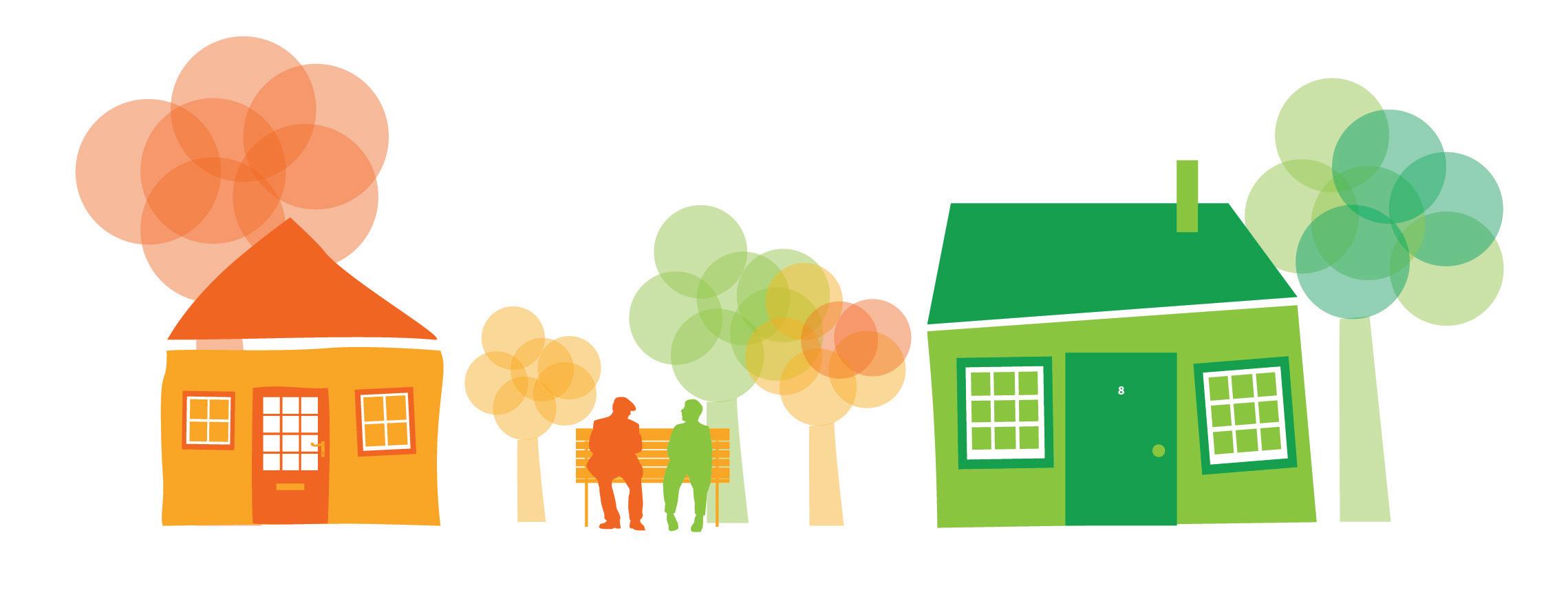
Age Scotland’s Friendship Services
Age Scotland offers a selection of Friendship Services for older people who would like some extra companionship.
Our Community Connecting service can help you find social groups and activities in your area. A volunteer will call to get to know you and find out what you may enjoy. They will get back to you with options local to you and check in with you as you try them out.
Our Friendship Calls are weekly telephone calls of friendship, support and companionship to older people in Scotland. One of our team of volunteers will call you at a weekly time slot convenient to you, ready with a listening ear for a friendly and informal chat.
Our Friendship Circles invite older people to join regularly scheduled group telephone calls based around a shared background, interest or language. Conversations on each agreed topic will be hosted by a volunteer, at the same time each fortnight, with up to 8 older people taking part.
As well as calling the Age Scotland helpline for advice or to access our Friendship Services, you can also call for a friendly chat. The helpline is open weekdays from 9am-5pm on 0800 12 44 222. Our advisers will be happy to speak to you.
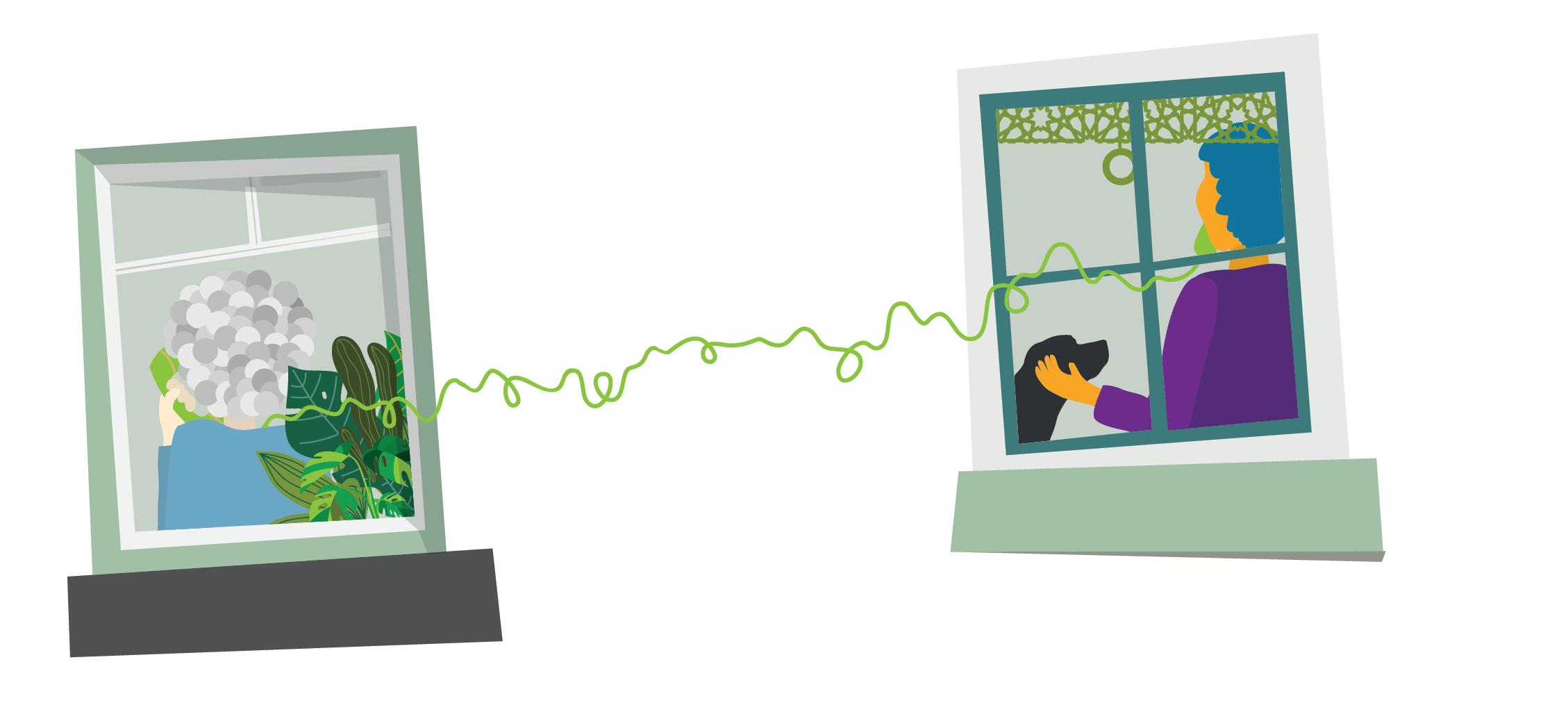
Caring for your health
Taking care of ourselves can give us more energy and improve our mood. This may help us to deal better with challenges and to get more enjoyment from life.
Eating well
Sticking to a healthy diet can sound like a big challenge. Instead, changing a few small things at a time can feel much more manageable, and you might notice a big difference. For example, simply drinking the right amount of fluid each day could improve your energy levels. Switching a sugary breakfast cereal for a healthier alternative could also have a big impact. Why not try making one change a month to see if you notice a difference?
More ideas and information are available in the Age Scotland guides Eat Well: A guide for older people in Scotland and Hydration Matters. For copies, call the Age Scotland helpline on 0800 12 44 222 or visit www.age.scot/information.

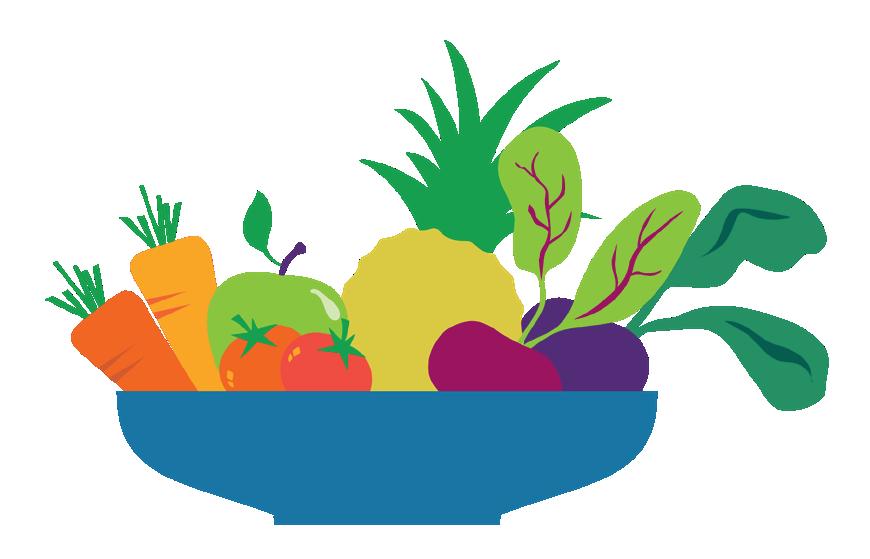



Keeping active
Just like eating well, the task of keeping active can feel overwhelming. If you are not in the habit of taking exercise it can be difficult to know how to get started. The good news is, starting small is best. A walk around the block, or even your living room, is a great start. If you have mobility or balance issues, try some chair-based exercise. Speak to a healthcare professional if you have any health conditions or if you have been inactive for a long time.
Exercising can be more enjoyable and easier to keep up if you do it with others. If you’d like to get involved in activities in your area, call the Age Scotland helpline on 0800 12 44 222 for help finding local groups.
The Age Scotland guide Keeping active in later life provides more ideas and information on taking care of yourself. Call the Age Scotland helpline on 0800 12 44 222 or visit www.age.scot/information.


Health services: who can help?
There are several ways to access NHS services. Knowing which service to turn to for your health issue or question could help you get the right advice sooner.

If you are experiencing chest pain or think you are having a heart attack, call 999. For more information about heart attack symptoms, visit www.nhs.uk/conditions/heart-attack/symptoms or call NHS Inform on 0800 22 44 88.
Pharmacists can give advice if you have a sore throat, cold or aches and pains. They can recommend non-prescription medicines and can advise you on whether you need to see a doctor. Pharmacists can also answer questions about medications you have been prescribed and which medicines may affect each other.
Prescriptions are free in Scotland. Most pharmacies will deliver your prescription to you if you cannot collect it yourself, but some may charge for this.
The NHS Pharmacy First service enables pharmacists to provide free treatment for some minor illnesses and conditions to people who are registered with a GP in Scotland. You need to register for this service at a community pharmacy.
GP practices offer a range of services to prevent and treat illnesses and support people with long-term physical and mental health conditions. GPs can also refer you to hospitals, specialists and other health services.
If you have new symptoms that a pharmacist cannot advise on, or that are continuing or worsening after a few days, contact your GP surgery. Many GP appointments are now carried out by phone with a follow up face-to-face appointments if needed.
NHS 24 is a 24-hour national service staffed by health professionals and can provide out-of-hours advice about urgent health issues. They can connect you to your local Accident and Emergency service or the Scottish Ambulance Service if needed. Call them on 111 or visit their website www.nhs24.scot.
NHS Inform can provide information about non-urgent health issues and services, and about your rights and responsibilities when using the NHS. Visit www.nhsinform.scot or call 0800 22 44 88.
Minor injuries units are for patients with non-life-threatening injuries. They are often based in hospitals and can treat broken bones, minor burns, head and eye injuries, and insect and animal bites. They can arrange for you to be transferred for specialist help if they find a more serious problem. You can find your nearest unit by calling NHS Inform on 0800 22 44 88 or at www.nhsinform.scot/ scotlands-service-directory.
Accessing NHS Services:
Who to contact and how

Routine checks and vaccinations
It is recommended to keep up with health appointments that screen for diseases and conditions that are best treated early. Screening is available for certain groups of people in Scotland for cervical, bowel and breast cancer, Abdominal Aortic Aneurysm (AAA) and diabetic retinopathy. For more information, visit www.nhsinform.scot/screening or call NHS Inform on 0800 22 44 88.
Vaccines against flu, pneumonia, COVID-19, shingles and Respiratory Syncytial Virus (RSV) are offered to certain groups of people. This depends on age and whether you have other illnesses or conditions. For more information, visit www.nhsinform.scot/healthy-living/ immunisation or call NHS Inform on 0800 22 44 88.
For more information about the NHS in Scotland, see our guide Accessing NHS Services: Who to contact and how. Call the Age Scotland helpline on 0800 12 44 222 or visit www.age.scot/information.
Accessing NHS Services: Who to contact and how
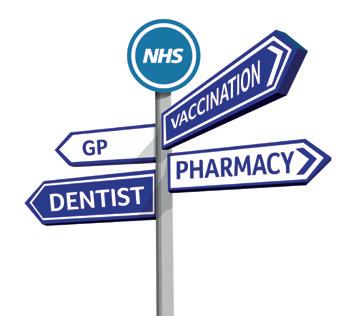
Planning for the future
Putting your wishes in writing can help you feel more at ease about what the future may bring. It can also help take the pressure off loved ones who may need to speak on your behalf. There are a number of ways to officially state your wishes about different situations.
Setting up Power of Attorney
Power of Attorney is a legal document that allows someone you choose to make certain decisions for you if you need or want help. It must be registered with the Office of the Public Guardian in Scotland. There are two main types of Power of Attorney:
Continuing Power of Attorney allows you to appoint someone to look after your property and financial affairs. This could include the powers to manage bank accounts or sell a house. You can choose whether these powers start right away, or only if you become unable to manage your finances on your own.
Welfare Power of Attorney enables someone to make decisions about your health and welfare, but only if you become unable to do so. They cannot make decisions about your welfare if you have the capacity to decide for yourself.
It is important to choose the right person, or people, to make decisions on your behalf. You should choose someone you trust, and who has a good understanding of what matters to you most.
For more information, see A guide to Power of Attorney in Scotland. Call the Age Scotland helpline on 0800 12 44 222 or visit www.age.scot/information. A guide to Power of Attorney in Scotland
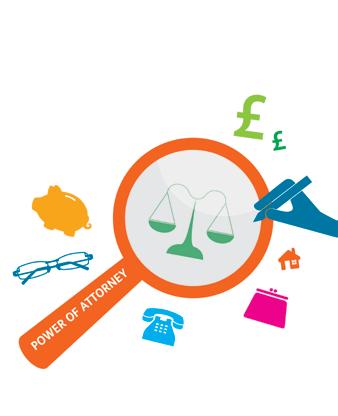
Future healthcare decisions
In Scotland, future care planning allows you to record your wishes about medical care and have these attached to your medical notes. This allows any healthcare professionals who treat you to be aware of your preferences.
There are specific documents you will need to complete in some cases. Wishes about life-saving treatments should be recorded in a document called an advance directive. For wishes about treatment of a mental health condition, you need to create an advance statement. These documents should be provided to anyone involved in your care, such as medical professionals and your Power of Attorney if you have one. They are not legally binding, but they make your wishes clear to the people caring for you. This means they can consider your preferences if you become too unwell to speak for yourself.
You can include these documents as part of your Power of Attorney paperwork, but this does not make them any more legally binding. You should still tell medical professionals and friends and family about your decisions.
The Age Scotland guide Planning for your future healthcare provides more information on recording your wishes. Call the Age Scotland helpline on 0800 12 44 222 or visit www.age.scot/information.
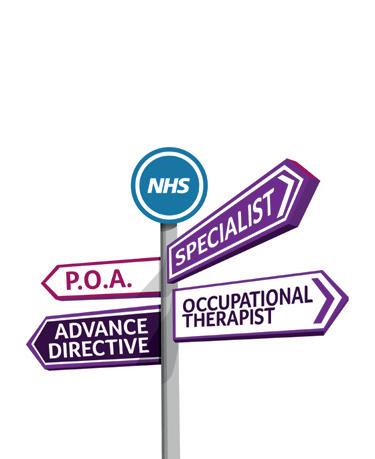
Planning for your future healthcare
Writing a Will
Writing a Will allows you to choose what you would like to happen with your money and possessions when you die. Although there are legal rules in Scotland for dividing these up if someone dies without a Will, there can sometimes be uncertainty, disputes and legal expenses. Surviving relatives may even need to go to court to sort things out.
Writing a Will might feel unsettling, but it may also bring a sense of relief to know that your wishes are clear and can be carried out when the time comes.
You can write a Will yourself, but it is better to use a solicitor to write or at least check your Will. Problems can arise after your death if mistakes have been made, if your Will is not entirely clear, or if it has not been properly signed or witnessed.
The cost of using a solicitor varies depending on how complex your Will is and which solicitor you choose. There are options available that can help with the costs of writing a Will:
• Age Scotland offers a free Will-writing service to help make the process of writing or updating your Will as straightforward as possible. As part of this service, you’ll be invited to consider leaving a gift to charity, but there is no obligation to do so. Visit www.age.scot/freewillservice for details or call the Age Scotland helpline on 0800 12 44 222.
• Will Aid is a partnership between the legal profession and seven different UK charities. Participating solicitors volunteer their time to write basic Wills and invite a voluntary donation to Will Aid in return. This is divided equally between its partnering charities. Call 0300 0300 013 or visit www.willaid.org.uk for information.
• Other solicitors also offer free Will-writing services in return for a donation to charity
• You might qualify for help with the legal costs of writing a Will. The Scottish Legal Aid Board’s website www.slab.org.uk includes information about solicitors who sometimes provide services that are funded, or part-funded, by legal advice and assistance.
For more information, see our guide Making your Will. For a copy, call the Age Scotland helpline on 0800 12 44 222 or visit www.age.scot/information.
Funeral planning
Leaving instructions about your funeral lets your loved ones know your wishes when the time comes. You could leave instructions in your Will, or with a friend, relative, or solicitor.
It can be a good idea to set aside money for funeral costs if you are able. There are a number of ways to do this. These include taking out a funeral insurance policy or setting aside money in your Will.
For more information, see our Arranging a Funeral guide. For a copy, call the Age Scotland helpline on 0800 12 44 222 or visit www.age.scot/information.



Arranging a Funeral
Making your Will
How you can help
Our vision is a Scotland which is the best place in the world to grow older.
All the information we provide is free and impartial. It helps older people access their rights and entitlements and can be life changing.
We are also a lifeline for older people who are feeling lonely and isolated. You can help us to support older people who need us most. Together, we can make a difference.
Make a donation
No matter how small or large, donations make a massive difference and help us continue our important work.
Call 03330 15 14 60
Visit age.scot/donate
Complete the donation form and return by Freepost

Fundraise
Whether it’s having a bake sale or running a marathon, there are so many ways to raise vital funds to support our work. To find out more, call 0333 323 2400 or visit age.scot/fundraise.
Leave us a gift in your Will
By choosing to leave us a gift in your Will, your legacy will help us to continue being there for older people for generations to come. To find out more, call 0333 323 2400 or visit age.scot/legacy.
Please donate today

Complete the form and return by Freepost to RSBS-KEHC-GBBC, Age Scotland, Edinburgh, EH9 1PR
Your details
Title: Forename:
Address:
Postcode:
Surname:
City:
Date of birth:
By providing us with your telephone number and email address you are consenting to us contacting you via phone, text and email.
Email:
Home tel: Mobile tel:
I WOULD LIKE TO DONATE
£75 £50 £25 Other (£) I wish to pay by (please tick):
MasterCard Visa CAF
CharityCard Cheque
Name on Card
Card No
Expiry date
Security code (payable to Age Scotland)
Signature Date
I prefer not to receive a thank you acknowledgement for this donation
I would like information about leaving a gift in my Will
I WOULD LIKE TO MAKE MY DONATION WORTH 25% MORE
I want Age Scotland** and its partner charities to treat all donations I have made for the four years prior to this year, and all donations I make from the date of this declaration until I notify you otherwise, as Gift Aid donations

I am a UK tax payer and understand that if I pay less income tax and/or capital gains tax than the amount of Gift Aid claimed on all my donations in that tax year it is my responsibility to pay any difference
Yes, I want Age Scotland** to claim Gift Aid on my donations I do not wish you to claim Gift Aid on my donations
Keeping in touch
Date
You can read Age Scotland’s privacy policy at . We will stay in contact by post unless you ask us not to We will never sell your data and we promise to keep your details safe and secure You can change your mind at any time by emailing us on contact@agescotland.org.uk or calling us on 0333 323 2400.
Age Scotland is the Scottish charity for older people. We work to improve the lives of everyone over the age of 50 so that they can love later life.
Our vision
is a Scotland which is the best place in the world to grow older.
Let’s keep in touch
Contact us:
Head office
0333 323 2400
Age Scotland helpline 0800 12 44 222
Email info@agescotland.org.uk
Visit our website www.agescotland.org.uk
Sign up to our newsletter
Our regular newsletters by email contain details of our campaigns, services and how you can support our work.
Sign up today at age.scot/roundup
Follow us on social media
Our social media channels are a great way to keep up to date with our work and issues that affect older people.
Age Scotland, part of the Age Network, is an independent charity dedicated to improving the later lives of everyone on the ageing journey, within a charitable company limited by guarantee and registered in Scotland. Registration Number: SC153343. Charity Number: SC010100. Registered Office: Causewayside House, 160 Causewayside, Edinburgh, EH9 1PR
We are grateful to the Scottish Government for part-funding this publication
